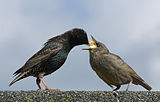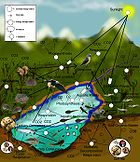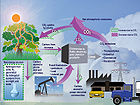- Detritivore
-
 Earthworms are a good example of soil-dwelling detritivores
Earthworms are a good example of soil-dwelling detritivores
Detritivores, also known as detritophages or detritus feeders or detritus eaters or saprophages, are heterotrophs that obtain nutrients by consuming detritus (decomposing plant and animal parts as well as organic fecal matter).[1] By doing so, they contribute to decomposition and the nutrient cycles. They should be distinguished from other decomposers, such as many species of bacteria, fungi and protists, unable to ingest discrete lumps of matter, but instead live by absorbing and metabolizing on a molecular scale. However, the terms detritivore and decomposer are often used interchangeably.
 Fungi are the primary decomposers in most environments, illustrated here Mycena interrupta. Only fungi produce the enzymes necessary to decompose lignin, a chemically complex substance found in wood.
Fungi are the primary decomposers in most environments, illustrated here Mycena interrupta. Only fungi produce the enzymes necessary to decompose lignin, a chemically complex substance found in wood.
Detritivores are an important aspect of many ecosystems. They can live on any soil with an organic component, and even live in marine ecosystems where they are termed interchangeably with bottom feeders.
Typical detritivorous animals include millipedes, woodlice, dung flies, slugs, many terrestrial worms, sea stars, sea cucumbers, fiddler crabs, and some sedentary polychaetes such as amphitrites (Amphitritinae, worms of the family terebellidae) and other terebellids.
Scavengers are typically not thought to be detritivores, as they generally eat large quantities of organic matter, but both detritivores and scavengers are specific cases of Consumer-Resource Systems.[2] Coprovores are also usually treated separately as they exhibit a slightly different feeding behaviour. The eating of wood, whether live or dead, is known as xylophagy. Τhe activity of animals feeding only on dead wood is called sapro-xylophagy and those animals, sapro-xylophagous.
Contents
Ecology
In food webs, detritivores generally play the role of decomposers. Detritivores are often eaten by consumers and therefore commonly play important roles as recyclers in ecosystem energy flow and biogeochemical cycles.
Many detritivores live in mature woodland, though the term can be applied to certain bottom-feeders in wet environments. These organisms play a crucial role in benthic ecosystems, forming essential food chains and participating in the nitrogen cycle.[3]
Fungi, acting as decomposers, are important in today's terrestrial environment. During the Carboniferous period, fungi and bacteria had yet to evolve the capacity to digest lignin, and so large deposits of dead plant tissue accumulated during this period, later becoming the fossil fuels.[citation needed]
By feeding on sediments directly to extract the organic component, some detritivores accidentally concentrate toxic pollutants.
Saprophytes
'Saprophyte' (-phyte meaning 'plant') is a botanical term that is now[citation needed] considered obsolete. There are no real saprotrophic organisms that are embryophytes,[citation needed] and fungi and bacteria are no longer placed in the Plant Kingdom. Plants that were once considered saprophytes, such as non-photosynthetic orchids and monotropes, are now known to be parasites on fungi. These species are now termed myco-heterotrophs.[4][5][6]
Saprophages
'Saprophages' are organisms that eat recently dead organisms, such as how vultures eat carrion.
See also
References
- ^ Wetzel, R. G. 2001. Limnology: Lake and River Ecosystems. Academic Press. 3rd. p.700.
- ^ Getz, W. (2011). Biomass transformation webs provide a unified approach to consumer–resource modelling. Ecology Letters,doi: 10.1111/j.1461-0248.2010.01566.x.
- ^ Nitrogen in Benthic Food ChainsPDF, Tenore, K.R., SCOPE publication.
- ^ Hershey DR. 1999. Myco-heterophytes and parasitic plants in food chains an webs. American Biology Teacher 61:575-578.
- ^ Leake JR. 2005. Plants parasitic on fungi: unearthing the fungi in myco-heterotrophs and debunking the ‘saprophytic’ plant myth. The Mycologist 19:113-122.
- ^ Werner PG. 2006. Myco-heterotrophs: Hacking the mycorrhizal network. Mycena News 57:1,8.
Feeding behaviours Carnivores adultHematophagy · Insectivore · Lepidophagy · Man-eater · Molluscivore · Mucophagy · Myrmecophagy · Ophiophagy · Piscivore · Avivore · Spongivore · Vermivore · Herpetivorereproductivecannibalistic
Herbivores Others Methods Apex predator · Bait balls · Bottom feeding · Browsing · Feeding frenzy · Filter feeding · Grazing · Hypercarnivore • Intraguild predation · Kleptoparasitism · Scavenging · TrophallaxisPredation · Antipredator adaptation · Carnivorous plant · Carnivorous fungus · Carnivorous protist · Category:Eating behaviors Categories:- Detritivores
- Eating behaviors
- Microbial growth and nutrition
- Mycology
- Soil biology
Wikimedia Foundation. 2010.


